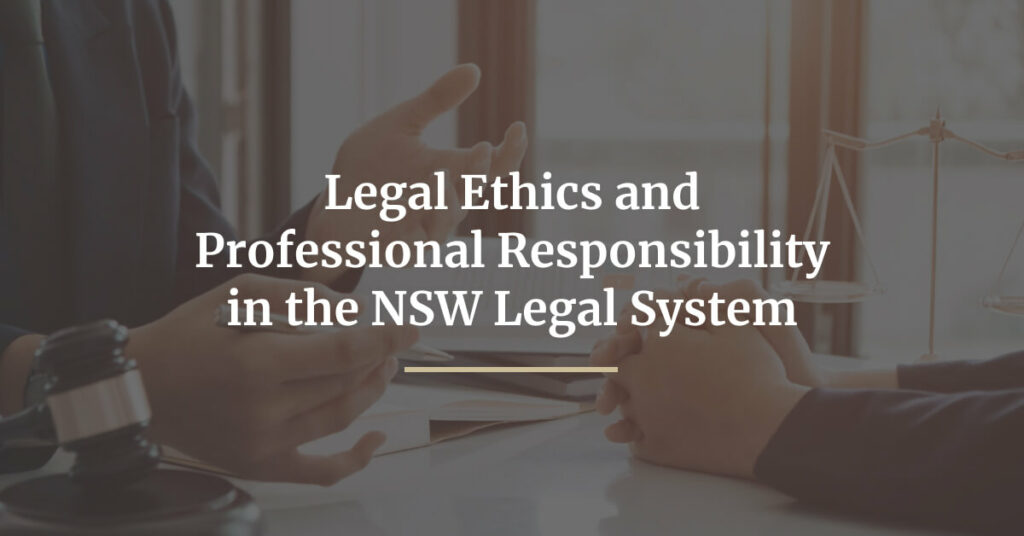Legal Ethics and Professional Responsibility in the NSW Legal System
Legal ethics and professional responsibility stand as the cornerstones that uphold the integrity and credibility of the New South Wales (NSW) legal system. In this discussion brought to you by Empower Wills & Estate Lawyers, we embark on a succinct exploration of these fundamental concepts, peeling back layers to reveal the pivotal role of ethical adherence and professional diligence in steering the moral compass of legal practices within NSW.
Core Principles of Legal Ethics
In the bustling corridors of NSW’s legal arenas, ethics are more than mere guidelines; they are the unspoken oaths that tether practitioners to moral and professional integrity. Legal ethics encompass:
- Integrity: Embodying an unwavering adherence to moral and ethical principles, ensuring honesty in all dealings, and fostering a reputation of reliability and credibility.
- Confidentiality: Safeguarding client information with staunch confidentiality, building a fortress of trust in the client-lawyer relationship.
- Competence: Ensuring rigorous knowledge and expertise in legal matters, guaranteeing apt and thorough legal guidance and representation.
- Conflict of Interest: Vigilantly avoiding situations where personal interests may contradict professional obligations, thereby preserving impartiality and objectivity.
These core principles serve as the skeletal framework, ensuring that legal practices not only abide by regulatory statutes but also align with ethical and moral imperatives, safeguarding the sanctity and trust embedded in the NSW legal system.
Legal Professionals and Ethical Challenges
Navigating through the varied roles within the legal profession in NSW – solicitors, barristers, and paralegals, among others – each career path is intimately entwined with unique ethical quandaries. Solicitors, often the first point of contact for legal advice, grapple with safeguarding client confidentiality while ensuring transparent communication. Barristers, navigating the courtroom, balance zealous advocacy with honesty and fairness. Paralegals and legal secretaries, while not always directly interacting with clients, hold the keys to vital information, placing a crucial duty of care upon their shoulders. These roles, though diverse, unite under the umbrella of ethical challenges such as:
- Client Confidentiality vs. Legal Obligations: Striking a balance between protecting client information and adhering to legal reporting obligations.
- Honesty vs. Advocacy: Navigating the tightrope between vigorous representation of clients and maintaining truthfulness in proceedings.
- Duty to Client vs. Duty to Court: Juggling the responsibility towards the client’s best interests with the overarching duty to the court and justice.
Regulatory Framework and Governing Bodies
Preserving the ethical integrity of the NSW legal system necessitates a robust regulatory framework and governing bodies ensuring stringent adherence to prescribed ethical norms. The two pivotal entities in this regard are:
- The Law Society of NSW: Overseeing solicitors mandates adherence to the Legal Profession Uniform Law (NSW), which encapsulates rules around conduct and practice, ensuring that solicitors not only serve client interests but also uphold the justice system’s integrity.
- NSW Bar Association: Regulating barristers, this entity ensures adherence to the Barristers’ Rules, safeguarding ethical practice within advocacy and advisory roles and maintaining the bar’s reputation.
These governing bodies, entwined with the regulatory frameworks, serve as the guardians of legal ethics in NSW, ensuring a calibrated moral and professional compass guiding legal practitioners through the intricate maze of responsibilities, duties, and ethical considerations. In this juxtaposition, they create an environment that intertwines legal proficiency with ethical practice, engendering a legal system that stands robust, fair, and morally grounded.
Professional Responsibility and Its Impact
In the echelons of the NSW legal framework, professional responsibility transcends basic legal acumen, intertwining duty and morality into the delivery of legal services. This involves:
- Client Welfare: Lawyers and solicitors in NSW are bound to act in the client’s best interests whilst navigating through legal pathways.
- Pro Bono Work: Engaging in pro bono services to ensure that legal services permeate through varied social strata, upholding social responsibility.
- Advocacy and Honesty: Balancing robust advocacy for clients whilst maintaining unblemished honesty and fairness towards the court and opposition.
This connection between responsibility and ethical practice in NSW does not merely influence the solicitor-client dynamic but cascades further, impacting the very delivery of justice and the public’s faith in the legal apparatus. It is this professional responsibility that ensures the stability and reliability of the justice system, ensuring its sustainability and credibility.
Conclusion
Navigating through the intricate weaves of legal ethics and professional responsibility, NSW’s legal system highlights a deep-seated alliance between moral practice and justice delivery. The journey from understanding fundamental ethical principles and recognising challenges through to observing regulatory safeguarding underscores a stark yet harmonious intersection where legal practice and moral obligation converge. It emphasises that maintaining an unwavering ethical compass within the legal profession is not merely an obligation but a keystone in upholding the sanctity and trust within the NSW legal framework.
Disclaimer: the information in this article relates to NSW law as at the date it was written and is general information only. It does not constitute legal advice and should not be relied upon as legal advice. It may contain information or links to sources which are no longer current. If you have a question or legal issue we recommend you contact a lawyer and obtain legal advice that takes into account your specific facts, circumstances, needs and objectives.

